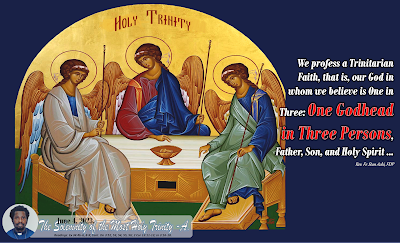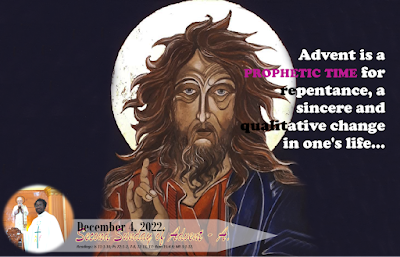THE HOLY TRINITY, MYSTERY OF LIFE AND LOVE.
June 4, 2023.
The Solemnity of the Most Holy Trinity -A.
Readings: Ex 34:4b-6, 8-9; Cant. Dn 3:52, 53, 54, 55, 56; 2Cor 13:11-13; Jn 3:16-18.
“Glory to the Father, the Son, and the Holy Spirit; to God
who is, who was, and who is to come.” Rv 1:8
A Romanian proverb says: “A threefold cord is not quickly
broken.” And a Jews proverb adds: “If triangles had a God, He'd have three
sides.”
The Entrance Antiphon "Blest be God the Father, and the
Only Begotten Son of God, and also the Holy Spirit, for he has shown us his
merciful love" opens us to the centrality of what we are celebrating
today, the Most Holy Trinity, the mysterious community and communion of love
between the Father, the Son, and the Holy Spirit. The Holy Trinity is the
mystery of God in himself, his deep identity, and his being.
As Christians, we profess a Trinitarian Faith, that is, our
God in whom we believe is One in Three: One Godhead in Three Persons, Father,
Son, and Holy Spirit. Our whole being is immersed in this mystery. Our identity
itself springs from there. We are Christians because we are baptized in the
Trinity. This is the central mystery of our faith and of Christian life. And
all our prayers are addressed to the Holy Trinity. Because we start them “In
the Name of the Father, and of the Son, and of the Holy Spirit”. And we end
them “Through our Lord Jesus, who lives and reigns with the Father, in the
unity of the Holy Spirit, one God forever and ever.”
Our Catechism states: "The Trinity is a mystery of
faith in the strict sense, one of the "mysteries that are hidden in God,
which can never be known unless they are revealed by God".58 To be sure,
God has left traces of his Trinitarian being in his work of creation and in his
Revelation throughout the Old Testament. But his inmost Being as Holy Trinity
is a mystery that is inaccessible to reason alone or even to Israel's faith
before the Incarnation of God's Son and the sending of the Holy Spirit."
CCC 237.
Therefore, what we know about the Holy Trinity is revealed
to us by God himself. We know who is the Son because the Father reveals him to
us: “This is my Son, whom I love; with him, I am well pleased.” These words
were heard specifically two times in two decisive occasions of Jesus' life, at
the beginning of his public life and mission through his Baptism and at the Transfiguration
announcing his passion. (Mt 3:17; Jn 3:16; Mt 12:18) We know who is the Father
because the Son told us about him and taught us how we should call him and pray
to him: "When you pray, this is what to say: Father, may your name be held
holy, your kingdom come..." (Lk 11:2; Mt 6:9) And in many other passages,
the Son spoke to his disciples about his Father and made him Our Father too by
adoption. And the Catechism adds on this matter saying: " By calling God
"Father", the language of faith indicates two main things: that God
is the first origin of everything and transcendent authority..." CCC 239
And finally, the Father and the Son unite to reveal to us the Holy Spirit. He
is the seal of love, the cement of communion and unity between the Father and
the Son. "Before his Passover, Jesus announced the sending of
"another Paraclete" (Advocate), the Holy Spirit. At work since
creation, having previously "spoken through the prophets", the Spirit
will now be with and in the disciples, to teach them and guide them "into
all the truth". The Holy Spirit is thus revealed as another divine person
with Jesus and the Father." CCC 243 And the Spirit is most known and
familiar to believers through his continual and permanent presence and action.
We said it last Sunday while celebrating Pentecost.
But then, how do we feel and discover the presence of the
Holy Trinity in our daily lives and how can we witness our Trinitarian being?
The readings, on this solemnity, provide us with some
answers. In the first reading, the accent is put on the Father. He was
introduced to the children of Israel as the God of mercy, tenderness, and
compassion, slow to anger, rich in kindness and faithfulness. The theophany of
the Horeb is a beautiful manifestation is a beautiful revelation of God's
identity to his people. Knowing who is their God will also determine their
relationship with him. If the gods of the Pagans are vindictive, punishers,
easily irritated, retributive, and filled with human attitudes, the biblical
God is different. He does not go angry because of human actions. He is not
wilful, nor spying our shortcomings. He is rather love, compassion, and mercy.
And the children of Israel will really experience all these attitudes and
attributes of God the whole of their journey toward the Promised Land.
The second reading comes to teach us something more about
our God. We learn that God is communion and unity. He is the communion of One
in Three Person. And this common unity of the Three persons, St. Paul says,
makes the journey with us day after day. We are guided in our lives by the
grace of God the Son, our Lord and Savior Jesus Christ. We are provided and
cared for through the love of God the Father. And we are protected and
surrounded by the fellowship of God the Holy Spirit. The Holy Trinity is also
at work in us, making of us a Trinitarian community. As such, our lives should
witness that divine presence and action in us. This passes through what Paul
recommends: Always rejoice, mend our ways, agree with one another, and live in
peace... A Christian who does not live that way, a Christian community where
those attitudes are not observed is just a constellation of hypocrites...
In the Gospel, in his discussion with Nicodemus, the Lord
Jesus, not only presents the mission of the Son, the reason why he was sent
into the world, and human salvation; but he also speaks of the singularity of
God's relationship with the world: love. The Holy Trinity is a communion of
love, as we said ahead. The Father loves the Son. The Son loves the Father. And
this relationship between them both becomes a third person, the Holy Spirit,
cement and the communion of love. Love, however, cannot be contained nor kept
for oneself. Therefore, it is overflowing in the world. Jesus says: "God
so loved the world..." And it is because of that love he sent the Son into
our human likeness to take upon himself our human nature and be one of us. The
Incarnation of the Son of God is a mystery of love. God's love in his Son and
for the world became flesh.





Comments
Post a Comment